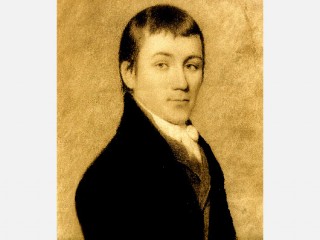
Charles Brockden Brown biography
Date of birth : 1771-01-17
Date of death : 1810-02-22
Birthplace : Philadelphia, Pennsylvania
Nationality : American
Category : Famous Figures
Last modified : 2011-02-09
Credited as : Novelist , and magazine editor, critic of contemporary literature
The American novelist and magazine editor Charles Brockden Brown was a predecessor of Edgar Allan Poe in horror fiction and a critic of contemporary literature.
Charles Brockden Brown was born in Philadelphia, Pa., on Jan. 17, 1771, the fifth son of Elijah and Elizabeth Armitt Brown, wealthy and liberal Quakers. Charles attended the Friends' Latin School, began the study of law, but soon gave evidence of the traits of melancholy, an interest in morbid psychology, and a commitment to literature that governed all of his short life.
With the brilliant and gifted Dr. Elihu Hubbard Smith, the dramatist William Dunlap, and others, Brown formed literary and scientific clubs in Philadelphia and New York to discuss current ideas and issues. This intellectual sociability, however, provided only interludes between long periods of introspective retreat when he read widely and wrote with almost fanatic intensity.
Brown was deeply affected by the yellow fever epidemics which broke out in both cities during this time and took the life of Dr. Smith in 1798. Mainly because of his parents' objection to marriage "out of meeting," he remained a bachelor until 1804, when he married the Presbyterian Elizabeth Linn.
After the experimental novel Alcuin (1798), in which he expressed William Godwin's ideas on social justice and woman's rights, he undertook to Americanize the then popular Gothic novel of horrors. He gave it a local setting in the towns and untamed countryside he knew so well and added to its horrors from his knowledge of the pseudosciences and morbid psychology of his day. His was a complex personality, and his intense concern for moral issues was reflected in swift-moving plots; he produced in rapid succession Wieland (1798), Arthur Merwyn (1798-1799), Ormond (1799), and Edgar Huntly (1799).
Spontaneous combustion, sleepwalking, ventriloquism, compulsive behavior, and other scientific interests of the time often provided rational explanations for the seemingly occult mysteries that held suspense at a high level throughout the complex and often unresolved plots of these novels. Brown's skills, however, in dealing with extremes of character, swift-moving action, and a shifting narrative point of view gave them reader interest far beyond any other writing of the day.
Although recognized in his own time as a promising novelist, Brown was soon forced by illness and lack of financial success to turn to the editing of journals, in which his literary nationalism was tempered by his sound esthetic judgment of the work of others. His last years were devoted to the more commonplace novels Clara Howard and Jane Talbot (both 1804) and to effective tracts on current national problems.
Living at a time when a professional literary life was impractical because of the disorganized state of American intellectual society, Brown used his powerful, though imperfect, gifts to open many of the avenues which later writers like Poe, Nathaniel Hawthorne, and Herman Melville followed to achieve their masterworks.
The best general biography of Brown is Harry R. Warfel, Charles Brockden Brown: American Gothic Novelist (1949). Donald A. Ringe, Charles Brockden Brown (1966), provides a critical analysis of his major works, in biographical form.
















